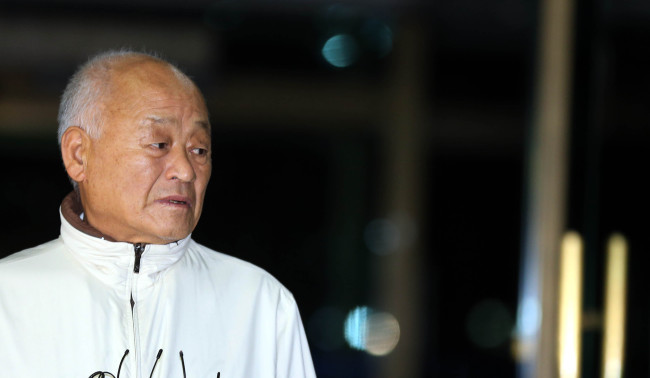Investigators step up hunt for former tycoon’s assets
By Suk Gee-hyunPublished : March 31, 2014 - 21:05
Government authorities held a private meeting on Monday as part of the widening investigation into the hidden assets of Huh Jae-ho, former chairman of the now-defunct Daeju Group.
The disgraced chairman has been bombarded with public criticism for allegedly receiving a lenient ruling from the Gwangju District Court, which would have allowed him to pay off billions in fines with 50 days of labor in a prison workhouse. While he claimed it would be financially difficult to pay the 25.4 billion won ($23.8 million) fine, part of which he already paid through six days of undemanding prison labor before being released, fresh allegations have surfaced that he has more to offer.
The disgraced chairman has been bombarded with public criticism for allegedly receiving a lenient ruling from the Gwangju District Court, which would have allowed him to pay off billions in fines with 50 days of labor in a prison workhouse. While he claimed it would be financially difficult to pay the 25.4 billion won ($23.8 million) fine, part of which he already paid through six days of undemanding prison labor before being released, fresh allegations have surfaced that he has more to offer.

Eleven government officials from four state agencies gathered at the Gwangju District Court at 11 a.m. to discuss details about levying the remaining 22.4 billion won fine, the court officials said.
The participating parties include the district court’s enforcement division, the Gwangju Regional Tax Office’s investigation team and the city government’s tax administration.
The meeting comes about a month after the authorities held their first meeting on Feb. 26, which apparently pressured the former business mogul to return from New Zealand, where he had been living to avoid paying the fines for the past four years. Huh returned home on March 22.
The latest confirmation from the investigators shows an additional 1.45 billion won of taxes in arrears by Daeju Group affiliates. The city government said on Monday that a Daeju construction firm had failed to pay nine different taxes in Gwangju, including its resident tax.
That makes Huh’s total outstanding sum of taxes about 26.05 billion won, including Huh’s personal arrearage of 2.4 billion won, the construction subsidiary’s unpaid tax of 20.5 billion won in Yongin, Gyeonggi Province, and Daeju Construction’s arrearage of 1.7 billion won.
As for the unpaid personal tax, Huh vowed to pay it after receiving an inheritance from his former wife, who passed away last year.
While the investigators are going after Huh’s massive fortune, some of it allegedly hidden under borrowed-name bank accounts, local reports claim the ex-chairman has secretly kept an immense tract of land worth a total of 57.4 billion won.
According to local daily Hankyoreh, Taejeon Construction, one of Daeju’s 30 affiliates, purchased a 19,900-square-meter tract of land in Taejeon, Gwangju City, on Dec. 22, 2006. The land value eight years ago was estimated to be around 33 billion won.
Construction has been underway in the area to build a large apartment complex and commercial buildings since April 2013, but a former Daeju official denied the Daeju company’s ownership.
“The land purchased by Taejeon Construction was sold in 2008 and Huh owns a zero stake in it,” the official told the paper.
The report also claims that Hanmi Piore, another Daeju subsidiary, owns a 204,100-square-meter plot of land in Opo, Gwangju, of which the cash value is expected to be around 24.4 billion won.
“Not 1 percent of it is true that the (former) chairman has a stake in Opo,” the official said.
Aside from the new accusations, regional tax authorities have confirmed that Huh owns a 70 percent share of property in Opo, Gwangju, near where the piece of land mentioned in the Hankyoreh report is located.
Other allegations are surfacing that Huh possesses another 19,000-square-meter plot of land in South Jeolla Province, under the names of former Daeju executives.
What began as a controversy over the court’s unfair ruling on Huh has now expanded into a bold revision of the related laws in the prison labor system and a reinvestigation into Huh’s fortune.
The developments have led the Supreme Prosecutors’ Office to scrap the ex-chairman’s prison labor penalty and pressured Gwangju District Court chief Chang Byong-woo, who valuated Huh’s daily labor at 500 million won, to step down from his post.
By Suk Gee-hyun (monicasuk@heradlcorp.com)










![[Hello India] Hyundai Motor vows to boost 'clean mobility' in India](http://res.heraldm.com/phpwas/restmb_idxmake.php?idx=644&simg=/content/image/2024/04/25/20240425050672_0.jpg&u=)







